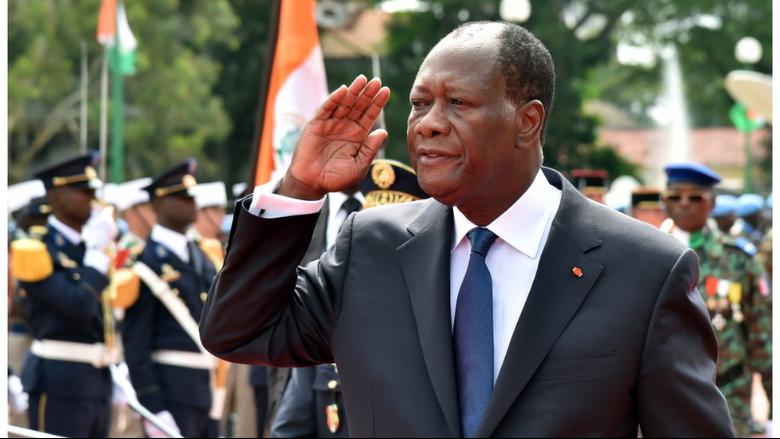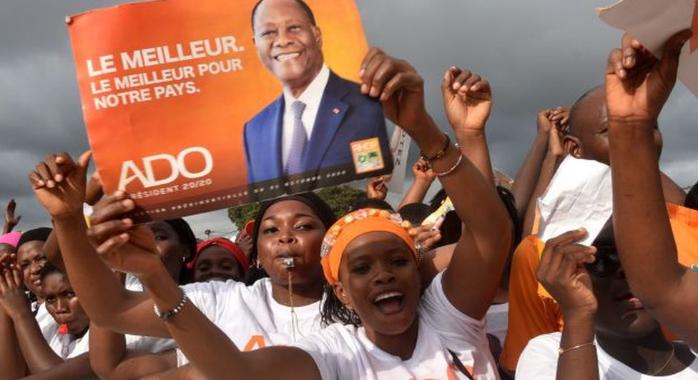INTRODUCTION
Ivory Coast Politics takes place within the context of a democratic presidential-parliamentary republic, whereby the President of Ivory Coast is both head of state and head of government, and of a multi-party structure. The President and the government exercise executive authority. In both the government and parliament, legislative authority is vested. Yamoussoukro has been the capital since 1983; Abidjan remains the commercial hub, however. In Abidjan, most countries retain their embassies. Between 2002-2004, a civil war was fought in Ivory Coast and a second civil war broke out in March 2011 after disputed elections in which President-elect Alassane Ouattara came to power in 2011 and was re-elected in 2015.

President of Cote d’ivoire, President Alassane Ouattara
A conflict in the Ivory Coast (also known as Côte d'Ivoire) that started in 2002 was the First Ivorian Civil War. The country remained divided into two, with a rebel-held north and government-held south, while much of the fighting ended by late 2004. Increased aggression and increased raids on foreign soldiers and civilians. As of 2006, the region was tense, and many said the UN and the French military struggled to calm the civil war. When it qualified for the 2006 FIFA World Cup and took the warring sides together the Ivory Coast national football team was credited with helping to secure a temporary truce. Following the civil war, the United Nations Operation in Côte d'Ivoire started to calm down, but peacekeepers have faced a difficult situation and are outnumbered by civilians and insurgents. On 4 March 2007, a peace agreement to end the war was signed. The Ivorian elections took place in October 2010 after being delayed six times. Fighting resumed on 24 February 2011 over the impasse on the election results, with the New Force rebels capturing Zouan-Hounien, and clashes in Abobo, Yamoussoukro, and around Anyama.
CONSTITUTIONAL FRAMEWORK
The 2016 constitution maintains the country as a presidential, democratic republic, adding the post of vice-president to the executive branch and moving the legislative branch from a unicameral to a bicameral system, with the addition of an upper chamber, the Senate. The head of state, the commander-in-chief of the armed forces, and the head of the executive is the president, elected by universal adult suffrage for a maximum of two consecutive, five-year terms. Candidates must have Ivorian nationality, with at least one of their parents being Ivorian by birth. The President of Ivory Coast is currently Alassane Ouattara. In the 2015 Ivorian presidential election, he was reelected. Following the ratification of the new Constitution by referendum, President Alassane Ouattara is expected to nominate a Vice-President before 2020. From 2020 onwards, the President and Vice-President will run on a joint ticket. They will both be elected for a term of five years, with only one reelection necessary.
· EXCEUTIVE BRANCH
The 1959 constitution of Ivory Coast provides for a powerful presidency in the sense of a separation of powers. The president, elected for a five-year term, is personified by the executive. The President shall be the Armed Forces Commander-in-Chief, may sign and ratify such treaties, and may submit a proposal to the National Referendum or the National Assembly. According to the Constitution, in the case of a vacancy, the President of the National Assembly assumes the presidency and he completes the remainder of the term of the deceased President. The cabinet is chosen by and is accountable to the president. Changes to some of these clauses are proposed, such as extending the term of office to 7 years, setting up a senate, and making the president of the senate an interim successor to the president. Following the famous overthrow of the interim leader, Gen. Robert Guéï, who had declared a questionable victory in presidential elections, Laurent Gbagbo took power; Gen. Guéï himself assumed power on 25 December 1999, following a military coup against former President Henri Konan Bédié's government. In an election boycotted by several opposition parties, Gbagbo was elected president in 2000. For a five-year term, the president is chosen by popular vote. The president appoints the prime minister.
· LEGISLATIVE BRANCH
The Parliament of Ivory Coast is a bicameral body consisting of the Senate of Ivory Coast and the National Assembly. The president appoints a vice-president running mate, with the vice-president succeeding the president in the event of his death or incapacity in office. The president may also submit bills to the legislature, or a national referendum. He or she also appoints the head of government, the prime minister – currently Amadou Gon Coulibaly – and in consultation with them, the Cabinet. As of September 2019, this had 49 members, including seven secretaries of state, the vice-president, and the president. The president also has wide powers of appointment in the civil service and the military. The Parliament of Ivory Coast was composed only of the National Assembly before November 2016 and the future formation of the Senate. The National Assembly (Assemblée Nationale) has 255 members elected in single-seat constituencies for a five-year term. It passes legislation usually enacted by the President, while legislation may also be introduced. The Senate of Ivory Coast (Sénat) would have two-thirds of indirectly elected senators and one-third appointed by the president-elect, elected in single-seat constituencies for a five-year term.
· JUDICIAL BRANCH
The Ivory Coast is a ruling one-party state with the Republican Rally in control. The judicial system culminates in the Supreme Court of Ivory Coast. The High Court of Justice is competent to try government officials for major offenses. The Supreme Court or Court Supreme consists of four chambers: Judicial Chamber for criminal cases, Audit Chamber for financial cases, Constitutional Chamber for judicial review cases, and Administrative Chamber for civil cases; there is no legal limit to the number of members. For administrative purposes, Ivory Coast is divided into 58 departments, each headed by a prefect appointed by the central government. There are 196 communes, each headed by an elected mayor, plus the city of Abidjan with ten mayors The 58 departments (départements, singular - département) are listed in the article Departments of Ivory Coast.
2020 COTE D’IVOIRE PRESIDENTIONAL ELECTIONS
President Alassane Ouattara won a third term in Ivory Coast’s Oct. 31 election, with 94 percent of the vote. Was this a free and fair election? Some outside analysts suggest that it was not, raising memories of the country’s authoritarian past. Opposition candidates Henri Konan Bédié and Pascal Affi N’Guessan had called on supporters to boycott the vote, complaining Ouattara’s candidacy violated the presidential two-term limit. After the vote, police fired tear gas in front of Bédié’s home and arrested his top aides and N’Guessan for calling for new elections and announcing the creation of a parallel government. The challenges of the Ivorian 2020 elections have their roots in conflicts that began 30 years ago, when Ouattara and Bédié were rivals to succeed Félix Houphouët-Boigny, the country’s first president.

In September, the Constitutional Court affirmed Ouattara’s position that the 2016 constitution reset the term limit clock, ruling him eligible to run. The Court disqualified two prominent challengers, Gbagbo and former Ouattara ally and Prime Minister Guillaume Soro, for recent in absentia criminal convictions. Thousands of opposition supporters protested Ouattara’s 2020 run and dozens were killed in conflicts between supporters and opponents of the president. Meanwhile, N’Guessan (FPI) and Bédié’s boycott of the election showed limited success; official turnout this year was 54 percent, similar to turnout in the 2015 election. The 2020 Ivorian election follows a recent pattern of democratic backsliding in West Africa. Incumbents in Burkina Faso, Togo and Guinea exploited rule changes to subvert a two-term limit. Benin’s president disqualified political opponents with controversial court convictions. Burkina Faso protesters successfully forced their president to step down, but in most cases, incumbents remained in power. Ouattara is likely to survive in office, but the country has struck some potholes in the road toward democratic consolidation